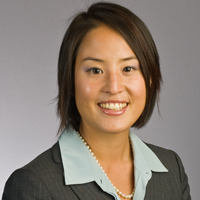PUBLISHED:June 15, 2010
Career Link: Law alumni offer guidance to colleagues in transition
Last year, Amy Yeung ’06 took a detour from her planned career path. She left a mutual fund regulatory practice at WilmerHale in Washington, D.C., and became assistant general counsel at ZeniMax Media, Inc., a company that develops video games.
“It wasn’t an easy choice,” says Yeung of her decision to leave her practice after two years. “It wasn’t something that was part of my plan, and I talked to a lot of people and did a lot of thinking before I made my decision.
“I talked to professors, partners, associates, and friends who know me well but aren’t in the legal profession. A lot of people have experiences that can really broaden your perspective. People can challenge your assumptions and help you reorganize and reevaluate your goals. Seeking that advice gave me an objective view that really helped me reframe my career.”
Aware that other young alumni are in career transition and a firm believer in strong support and networking systems, Yeung has been active in helping develop Career Link, a new initiative of the Law School’s alumni and development office, in concert with the Law Alumni Association (LAA) and its New Lawyers Division (NLD), to which she belongs.
Career Link consists of a nationwide network of alumni who can offer career advice and tips that might be useful to those pursuing jobs in a given region. Individuals looking to transition, regardless of their experience level, also can submit resumé information to Career Link’s anonymous intake commit¬tee and receive tailored advice about how best to proceed in their job search.
“It’s anonymous, aggregated advice from several different points of view,” Yeung says. “It’s the next step in refining the organic networking that is already out there.”
The alumni network is also available to offer guidance relating to relocation, such as housing, schools, and local bar and professional associations.
“A lot of us know people in the community who have been directly affected by the economy,” Yeung says. “And changing jobs generally is an inevitable aspect of our profession for all but a few. On the flip side, there are experienced lawyers in the Duke Law community who become aware of jobs and industry changes, and have the experience to help young lawyers contextualize their professional aspirations. People are reaching out for help and to help, and I think that Career Link is a way for the alumni community as a whole to collaborate.”
Yeung, who clerked in the Delaware Court of Chancery, is certain she made the right choice to step away from her preconceived career plan and go in-house, and she is grateful to the network of friends and colleagues who helped guide her through her transition.
“As assistant general counsel, my work cuts across different areas of corporate and regulatory law, and I’m enjoying it tremendously,” she says. “I don’t have to bill hours, which changes the entire culture. It allows me to just focus on getting my work done, and they’re giving me as much as I can handle. I can’t ask for more than that.”
“It wasn’t an easy choice,” says Yeung of her decision to leave her practice after two years. “It wasn’t something that was part of my plan, and I talked to a lot of people and did a lot of thinking before I made my decision.
“I talked to professors, partners, associates, and friends who know me well but aren’t in the legal profession. A lot of people have experiences that can really broaden your perspective. People can challenge your assumptions and help you reorganize and reevaluate your goals. Seeking that advice gave me an objective view that really helped me reframe my career.”
Aware that other young alumni are in career transition and a firm believer in strong support and networking systems, Yeung has been active in helping develop Career Link, a new initiative of the Law School’s alumni and development office, in concert with the Law Alumni Association (LAA) and its New Lawyers Division (NLD), to which she belongs.
Career Link consists of a nationwide network of alumni who can offer career advice and tips that might be useful to those pursuing jobs in a given region. Individuals looking to transition, regardless of their experience level, also can submit resumé information to Career Link’s anonymous intake commit¬tee and receive tailored advice about how best to proceed in their job search.
“It’s anonymous, aggregated advice from several different points of view,” Yeung says. “It’s the next step in refining the organic networking that is already out there.”
The alumni network is also available to offer guidance relating to relocation, such as housing, schools, and local bar and professional associations.
“A lot of us know people in the community who have been directly affected by the economy,” Yeung says. “And changing jobs generally is an inevitable aspect of our profession for all but a few. On the flip side, there are experienced lawyers in the Duke Law community who become aware of jobs and industry changes, and have the experience to help young lawyers contextualize their professional aspirations. People are reaching out for help and to help, and I think that Career Link is a way for the alumni community as a whole to collaborate.”
Yeung, who clerked in the Delaware Court of Chancery, is certain she made the right choice to step away from her preconceived career plan and go in-house, and she is grateful to the network of friends and colleagues who helped guide her through her transition.
“As assistant general counsel, my work cuts across different areas of corporate and regulatory law, and I’m enjoying it tremendously,” she says. “I don’t have to bill hours, which changes the entire culture. It allows me to just focus on getting my work done, and they’re giving me as much as I can handle. I can’t ask for more than that.”
